Hart
Forum Replies Created
-
AuthorPosts
-
16/12/2022 at 11:47 am in reply to: SOFER Initiative wins the WASME Resilience Award 2022 in South Africa #20467
Hart
KeymasterThe SOFER Initiative has recently been honored with the Small and Medium Enterprise (SME) Resilience Award 2022 in Johannesburg, South Africa for its Fishing Net Gains (FNG) Project, a solution to the problem of marine debris in Nigeria and Cameroon. This project aims to remove waste fishing gear from the ocean and support the economic viability of local communities.
We are proud to receive this prestigious award, which recognizes our dedication to tackling the issue of ghost fishing and our ongoing efforts to find sustainable solutions. We would like to express our gratitude to the World Association of Small and Medium Enterprises (WASME) for this recognition, as well as to our hardworking team of staff and volunteers and the supportive communities and supporters of our project around the world.
But most importantly, we would like to thank God for this milestone and for the opportunity to make a positive impact on the health of our oceans. We are committed to continuing our work to protect the marine environment and support the well-being of local communities.
You can learn more about WASME and the award @ http://www.wasmeinfo.org
Hart
KeymasterAccording to the words of Margaret Mead, we won’t have a society if we destroy the environment.
World Earth Day is an annual event to demonstrate support for environmental protection. SOFER Initiative has been at the forefront of creating awareness and also implementing several projects to reduce, reuse and recycle waste while improving biodiversity and promoting a positive attitude towards the environment. Some of these projects include: Fish Net Gains West Africa, Airgent, Beach Cleanup, WASH, Green Christmas, etc.
Now is the time for the unstoppable courage to preserve and protect our health, our families, and our livelihoods.
For Earth Day 2022, we need to act (boldly), innovate (broadly), and implement (equitably). It’s going to take all of us. All in. Businesses, governments, and citizens — everyone accounted for and accountable. A partnership for the planet.
21/04/2022 at 5:39 pm in reply to: SOFER Initiative Wins another Publication in the GloLitter Partnerships Project Report 2022 #20285Hart
KeymasterThe report publication provides an overview of the fishing related marine plastic litter problem and its current status around the world. It focuses more specifically on ALDFG or “ghost gear”, situating its impact and contribution to the broader issue of sea-based plastic litter.
The Fishing Net Gains Project carried out by SOFER Initiative is recognized globally to be one of the first top and effective remediation stratedy towards reducing Abandoned Lost or otherwise Discarded Fishing Gears (ALDFGs). This is fully captured in section 2.3.1 of the GloLitter Partnerships Project Report on good practices to prevent and reduce marine plastic litter from fishing activities.
Publisher: FAO; International Maritime Organization (IMO);
Place of publication: Rome, Italy; London, England;
Year of publication: 2022
Author: Giskes, I., Baziuk, J., Pragnell-Raasch, H., Perez Roda, A.
Agrovoc: sea pollution; plastics; fishing gear; impact assessment; risk reduction; best practicesReport Link: https://doi.org/10.4060/cb8665en
Hart
KeymasterInternational Women’s day is a day set aside to celebrate the social, economic, and cultural achievements of women. It is also a day to acknowledge the numerous contributions women make to the progress of the human race and to raise awareness of any bias against them.
This year’s celebration, which has as its theme Break The Bias focuses on the need for women to be given equal opportunities.
At Stand Out For Environment Restoration (SOFER) Initiative, we continue to value women and the amazing potential they possess, therefore our activities and projects are always planned to be gender inclusive and eliminate any bias against women and girls.
Our laid down policy necessitates the equal inclusion of women and girls as our staff and volunteers. This is evident in the fact that women make up more than 50 percent of our overall staff and volunteers.
We at SOFER Initiative are also very keen on the impact our various projects have on women and girls. Our most recent project, The Fishing Net Gains Project has a specific activity tailored to empowering women and girls called the Craft Workshop.
Through the Craft Workshop, we have been able to train over 200 women in making useful craft items from derelict fishing nets in over four coastal communities in Nigeria.
In our quest to promote more sustainable environments, we continue to believe that women are propagators of change and should be given equal opportunities to showcase their abilities
Let’s all join hands and break the bias
Happy International Women’s Day CelebrationsHart
KeymasterAs part of efforts to raise awareness on the issue of Abandoned, Lost or otherwise Discarded Fishing Gears, we launched a craft contest to mark this year’s World Environment Day. The contest which recorded tremendous success got over forty entries from contestants who made different kinds of items majorly from cast nets. After a rigorous process, the contenders were narrowed down to a sizable number by our competent judges with the top three going home with cash prizes. Here are the profiles of contenders who stood out, as well as the crafts they made.
Peters Oluwatosin is a proud mother of four whom apart from being a computer operator, is also a lover of everything hand made. Based in Lagos State, Oluwatosin was one of the very enthusiastic trainees who came for our craft workshop in Badagry. Being from a a community where most people are predominantly fishers, she is regularly exposed to casually disposed nets mostly used as sponges for bathing or washing and never thought anything good could be gotten from it. During the workshop, She proved herself a genius and even served as a tutor for some of the participants. Hearing about the contest, she made a school and lunch bag for kids with detailed finishing and it earned her the bragging right as the 1st prize winner.
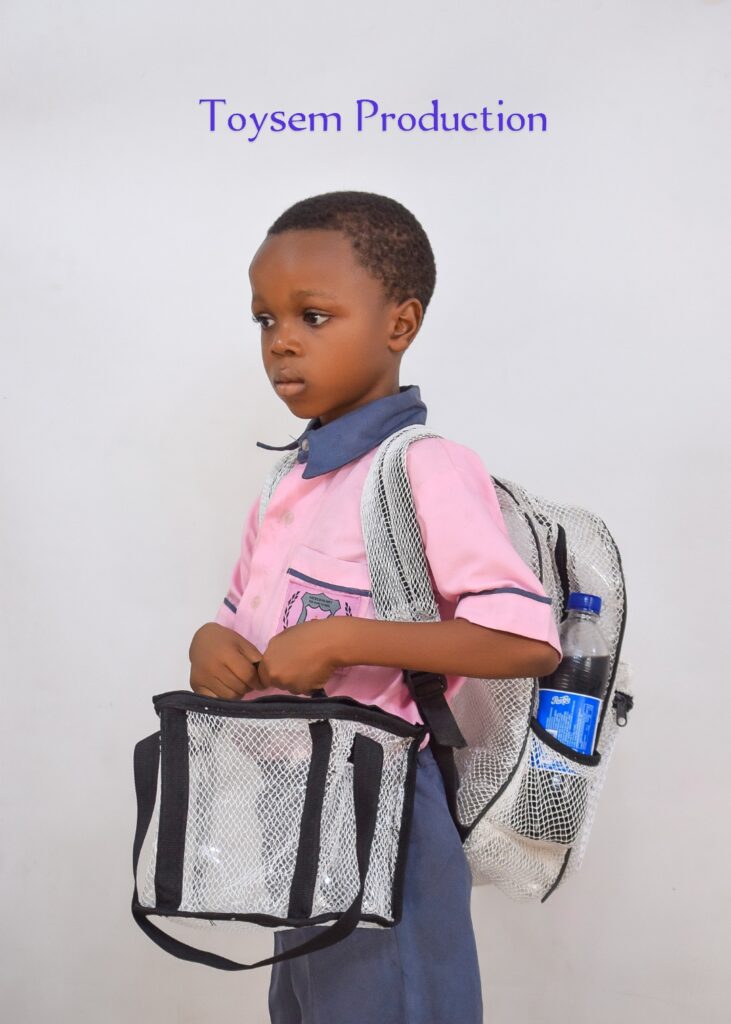
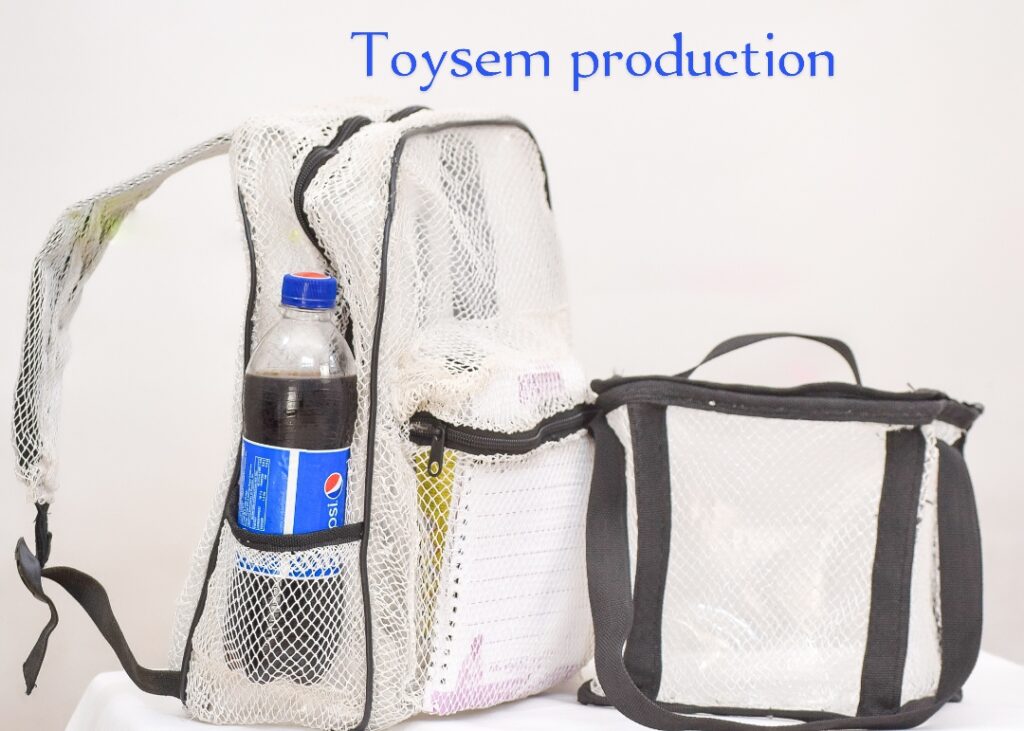
Lunch and School bag by Peters Oluwatosin Apart from the contest, she has also made other items such as foot mats and slippers. Oluwtosin has been going round schools in her community, teaching kids how to create from fishing nets and hopes that with time, she will be able to pass the knowledge to as many people as possible who would perhaps turn it into a source of livelihood. When next you see a child with a beautiful lunch or school bag, look closely, it may just be a cast net creatively repurposed.
Lawrence Alban is a graduate of Fine Arts Education, under Curriculum and Teaching from the University of Uyo, Akwa Ibom State who specializes in painting with biros. He has been into the arts for about six years now. He got to know about the craft contest through a friend. Thinking of what to make with a fish net for the very first time, he decided to make a Halloween themed home décor. Using twines and sugar paper to compliment the fishing nets, Alban created an artwork which shows a spider spinning its web. Given the time constraint, Alban’s artwork was quite exceptional and stood out among the judges. He hopes to continue creating with cast nets as the contest has opened him up to a new form of artistic expression. He is the 2nd place winner
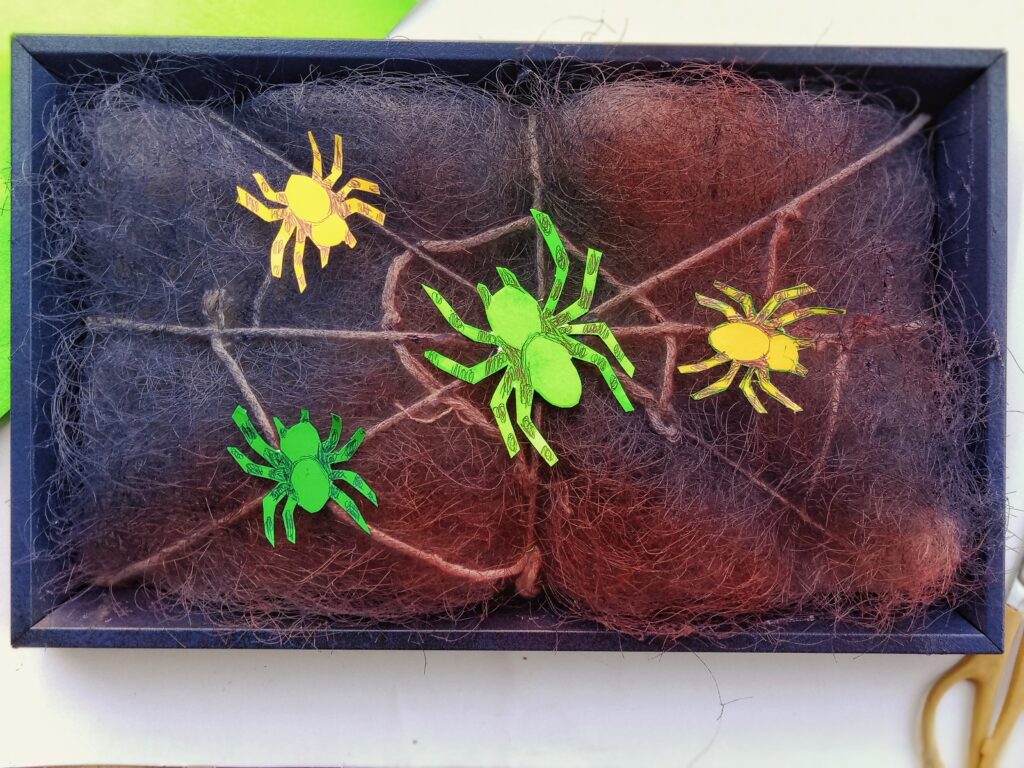
Craft by Lawrence Alban 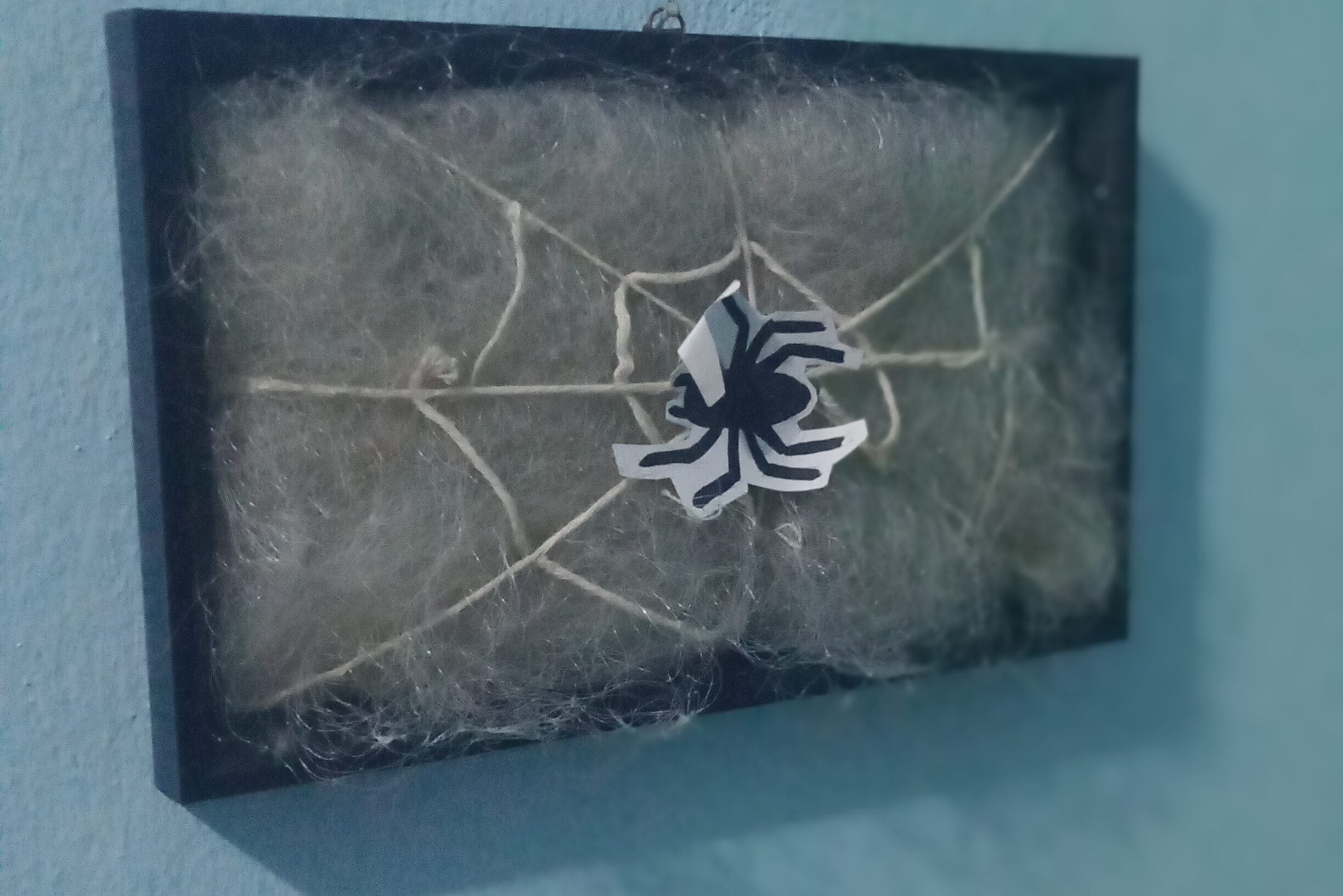
Craft by Lawrence Alban Bright Edet Just finished her secondary school last year and is Hoping to get admission into the University. She hails from Ibeno Local Government are of Akwa Ibom State and was among the trainees engaged during the craft workshop by SOFER Initiative in Ibeno community. For the contest, she made a basket, a hat as well as a little bag. Bright says she was inspired by the people who came to teach her and hopes her newly acquired skill will take her places. She emerged as the 3rd place winner.
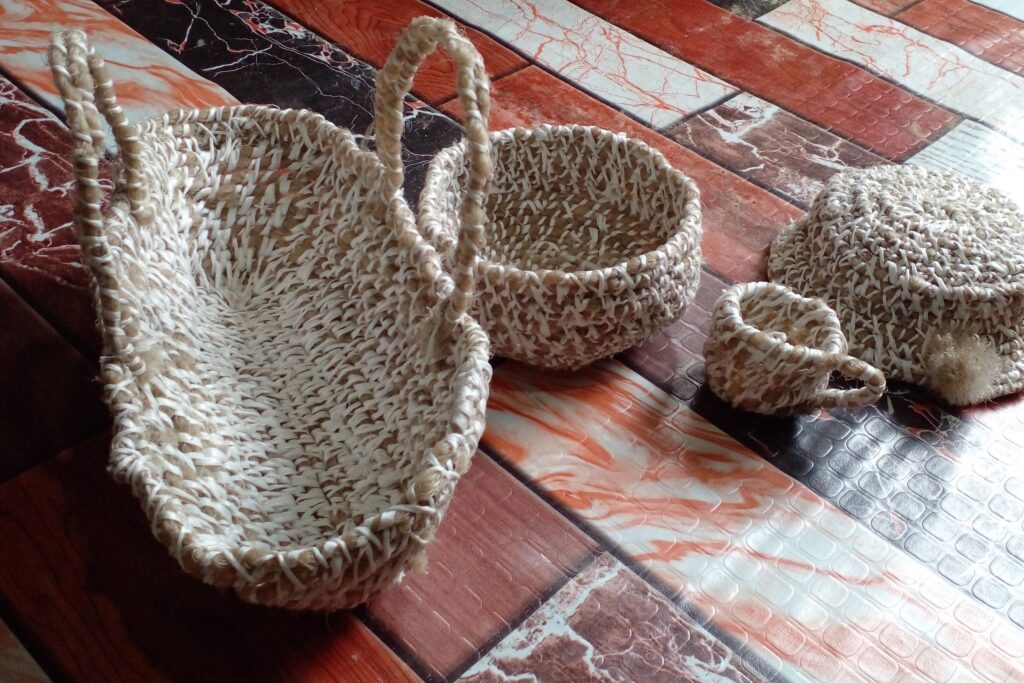
Craft by Bright Edet Maureen Effiong is a graduate of Environmental Protection and Resource Management from the University of Calabar, Cross River State. She hails from Ibeno Local government of Akwa Ibom State. Just like others, she
learned from a friend about a craft seminar that was to hold in her community and out of curiosity, she decided to attend. After the four days practice, Maureen did not relent. She kept on making crafts for personal use. When the craft contest opportunity presented itself, She went to the HubNet to source some nets, cleaned them up and made a very beautiful décor shaped like a half moon as well as earrings, and door blinds. According to her, all her siblings are also into craft making with cast nets and they are not stopping anytime soon. She emerged as one of the finalist.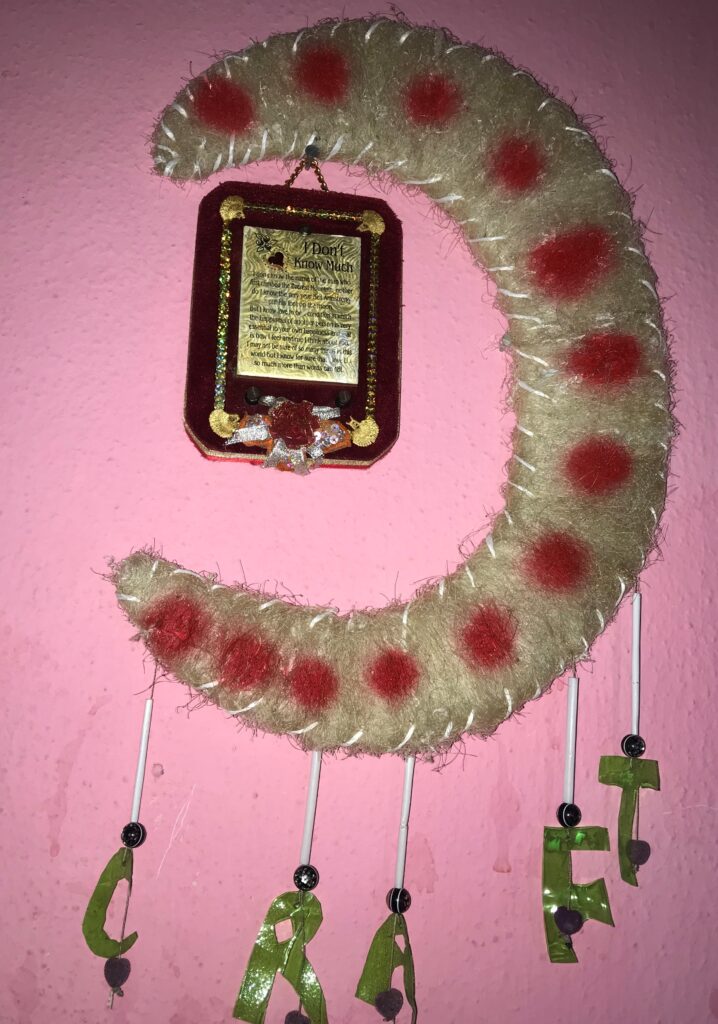
Half moon decor by Maureen Helen Edet is a 300 level Communication Arts undergraduate in the University of Uyo. She was one of the cast net craft trainees at Ibeno Local Government. Aside schooling, she is also a creative artist who uses beads to create necklaces, waist beads, hand accessories etc. According to her testament, when she was in the process of creating with cast nets, her friends were wondering what she was up to. It is no surprise that she left them as well as our judges in awe when she was done. She made an colourful decor which can be used at home or bars and restaurants for wall beautification. Helen is part of the finalist.
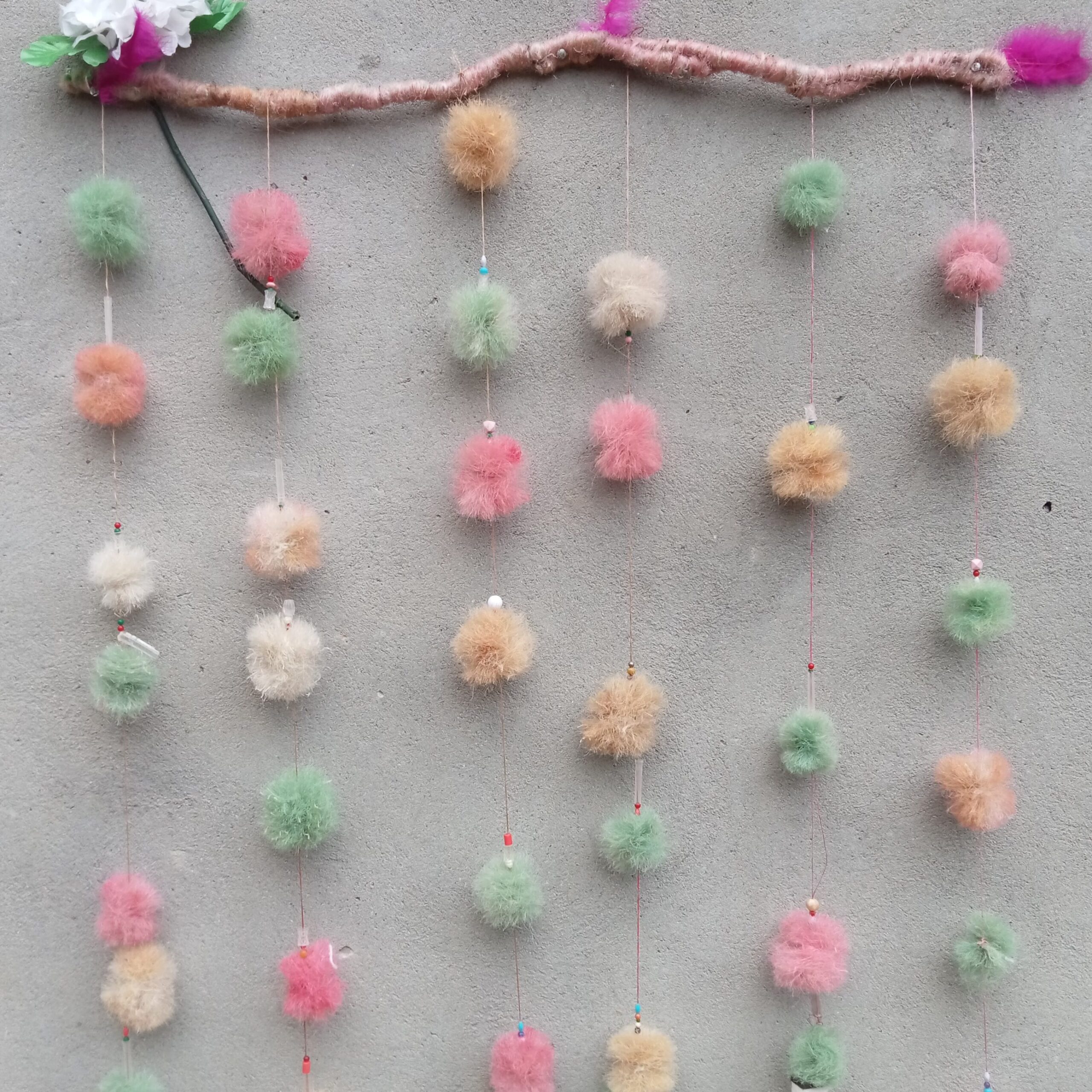
Craft by Helen Edet Gift Matthew Is a fashion designer from Ibeno Local Government Area who was also part of the workshop carried out by our team. Hoping to stand out amongst the other contestant, she got some nets from our HubNet in the community and made a hair net, basketball rim net as well as a handbag for the contest. She is hopes to move to a major city where she will fuse her fashion design expertise with her newly acquired craft skill to make items that will stand out. This way she will be making money for herself as well as help her community curb the menace of ghost gears. She is also among the finalist.
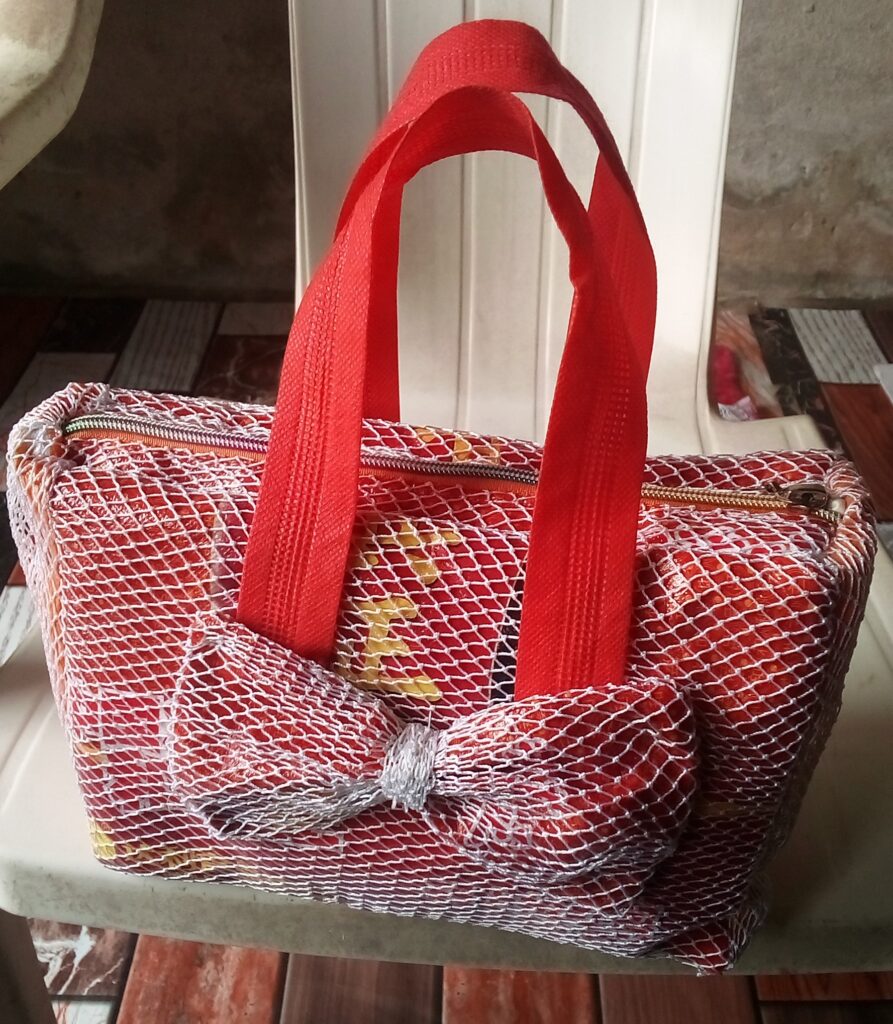
Handbag by Gift Matthew Oladipupo Kehinde: There is simply no doubt about Kehinde’s talent when it comes to craft as she had already proved herself during the craft training that held in Badagry. Taught how to make a foot mat on the first day, she turned up for the workshop on the second day with a hand bag, derived from some nets she took home. Kehinde who hails from Ijebu Ode, Ogun State entered the craft contest with yet another bag as well as a beautiful wig cap which earned her a comfortable spot amongst the top contenders. The wig can be worn by women who seek a little change from their regular fashion style. She said her hair styling training inspired the idea. Kehinde is also volunteer diver for SOFER Initiative
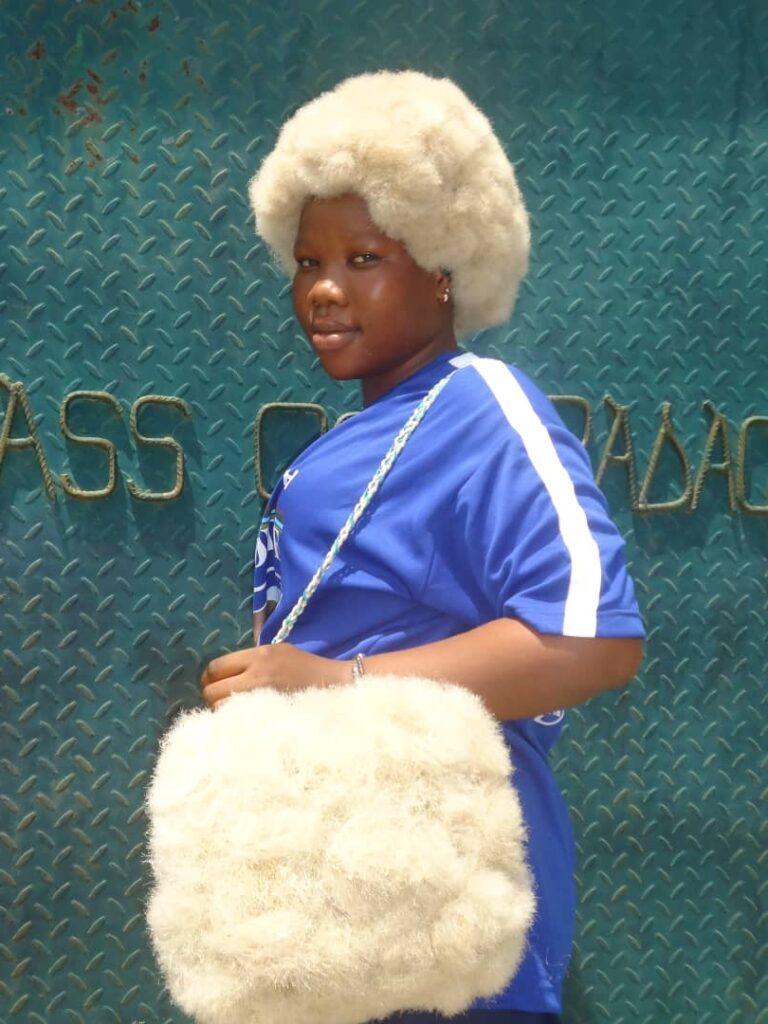
Bag and Wig by Oladipupo Kehinde *ALL THESE ITEMS AND MORE ARE AVAILABLE FOR SALE ON DEMAND.
07/06/2021 at 1:24 pm in reply to: World Environment Day: Highlights of the Ghost Gear Craft Contest #19438Hart
Keymaster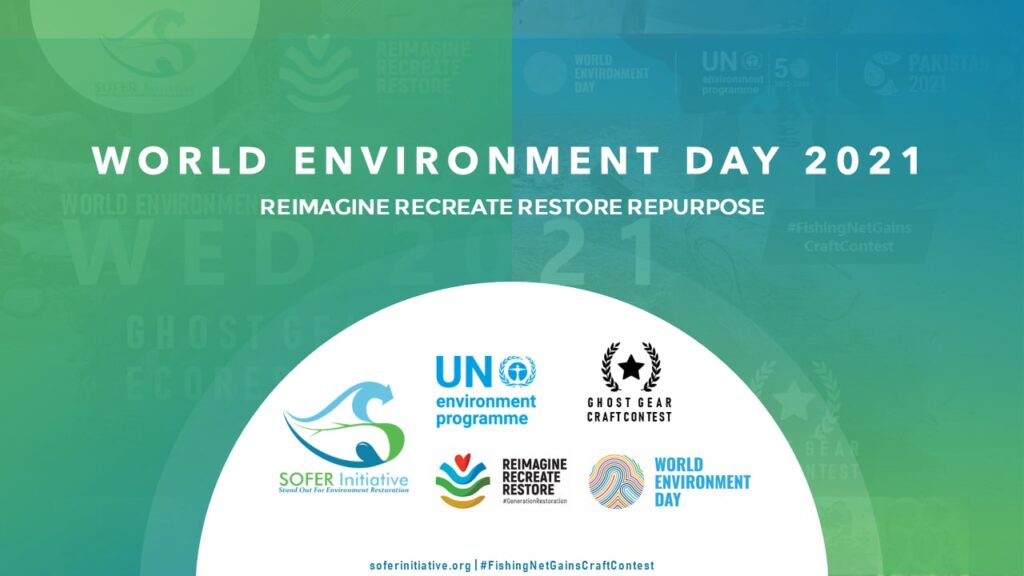
Hundreds of years ago, the city you are currently living in was filled with trees, a natural habitat for thousands of animals. But due to the ever growing population of humans and the endless quest for space and territories, lots of wildlife and plant species have been lost to deforestation and poaching. Since the industrial revolution, the air has been highly polluted due to harmful greenhouse gas emission. The ocean as well is not spared as decades of bad practices and human induced pollution has led to sea acidification, oil spills, plastic litter and ghost gear in our waters.
We cannot have the world in the best possible form nature handed us anymore; however, we can take practical steps to making sure the environment is safe again. This is through finding alternatives to actions and practices that causes these damages to the environment. As part of our effort to achieve a greener, healthier environment, we have been carrying out outreach in coastal communities in Nigeria, Sensitizing them through workshops and seminars on the issues of ghost gears and how it can be curbed. Through our staff and community volunteers, we have held crafts workshops for women, teaching them how ghost gears can be turned to valuable items and sold for additional income.
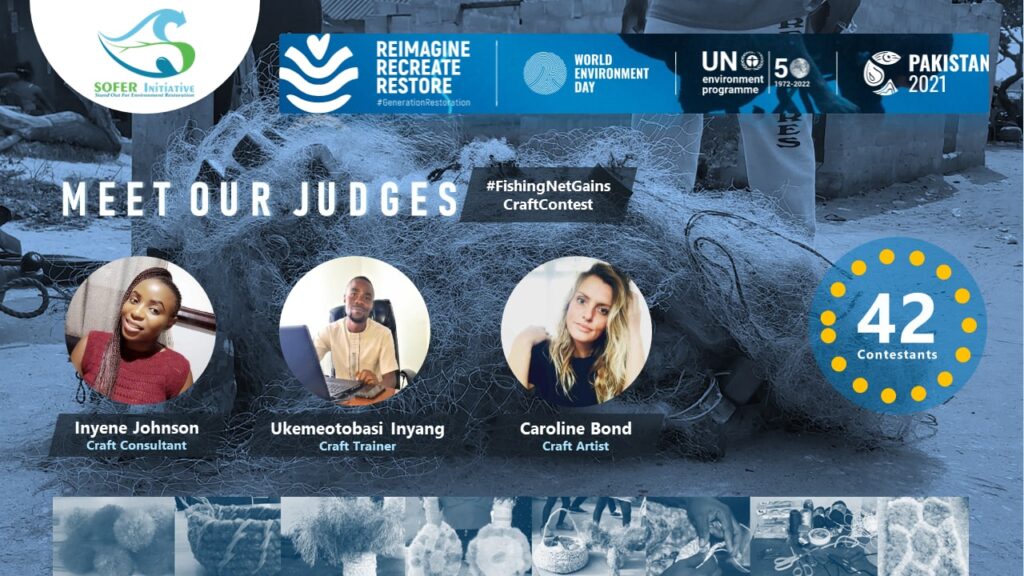
On the 5th of June 2021, we joined the rest of the world to celebrate World Environment Day. As part of the activities for this year’s event, we hosted a creative contest tagged “Ghost Gear for Ecorestoration.” This was in line with the theme for this year which was Ecorestoration. The contest was aimed at engaging crafters from far and near to lend a creative hand to environmental restoration. It was officially launched on the 25th of May for individuals and groups and was open to submissions for about five days. Surprisingly, we received an array of incredible crafts from about 42 crafters, all made from ghost gears.
The contest had Inyene Johson and Ukemeotobasi Inyang ; our in-house craft consultant and trainer respectively, as adjudicators, as well Caroline Bond, an international craft artist from the United Kingdom. The basis for judgement was creativity, market value, finesse and durability and the contestants lived up to expectation. In a virtual ceremony to mark the World Environment Day as well as announce the winners, the Director of SOFER Initiative, Emmanuel Sofa noted that it was imperative for us to seek effective ways to offload the pile of ghost gears currently housed in our HubNets at different locations in the country. He further stated that a top fashion brand is already making plans to make fashion items strictly from ghost gear and as such the contest was a foot in the right direction.
Announcing the top three winners, the guest judge, Caroline Bond admitted to having a hard time picking the winners as there were so many outstanding crafts entered in the contest. Eventually, Bright Edet, who made Baskets, Cup and a Hat was declared the 3rd place winner, taking home the prize money of N20,000. Lawrence Alban, with a beautifully crafted home décor got the second place with the sum of N30,000 while Rosemary Peters who made a school bag and food pack emerged the overall best with the prize money of N50,000. The winners and the top ten contestants will be given exposure by SOFER Initiative through our website and social media handles. We will also help them sell most of the items.
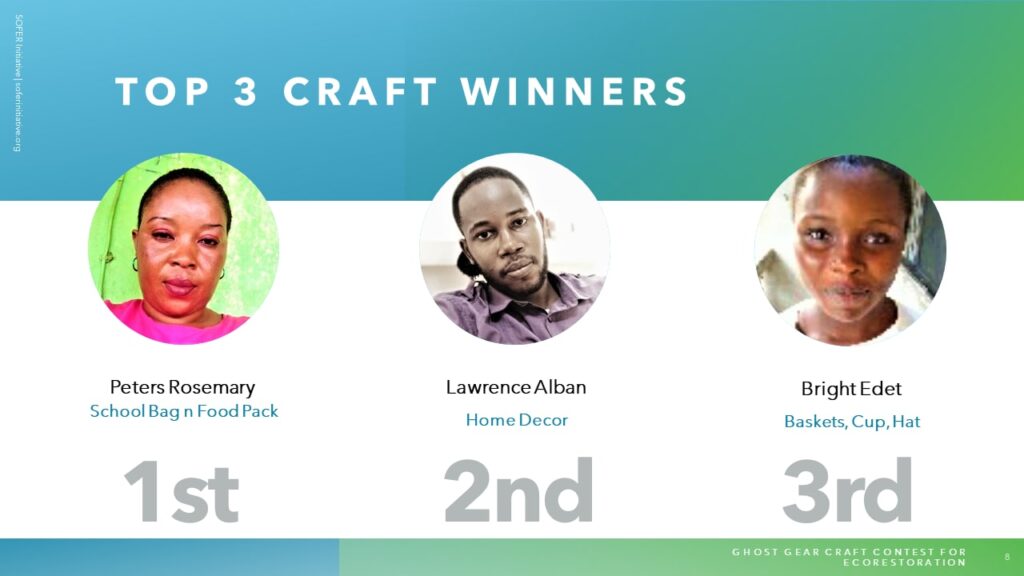
Some of the awardees who attended the virtual event couldn’t hold back their excitement as they thanked the team for putting the contest together. We are also thankful for the massive participation and also extend our appreciation to our sponsor, staff, volunteers and everyone who contributed to making the event a success. We hope to continue with this; inspiring people to join the train of environment restoration. We also plan to make the craft contest even bigger when we celebrate another World Environment Day next year.
Hart
KeymasterAs greenhouse emission bite hard, species go extinct, people die from dangerous human activities and natural disasters, one can only but admit that the earth is under attack. This is even crazier because as humans, we can’t live beyond the quality of our environment. As the earth deteriorates, so do we. Several ecosystems are on the verge of collapse due to harmful human activities but as troubling as it sounds, many people still do not understand the scope of problems which the earth is faced with today.
It is against this backdrop that World Earth Day is celebrated on the 22nd of April every year; ever since it became a movement in 1970. So far it has worked with over 75,000 partners spread across 192 countries creating awareness on the imminent danger the earth faces and also inspired people, groups and organisations to take action against some phenomenon such as Warming Oceans, Deforestation, Coral Bleaching, Plastic Pollution, Melting Arctic Sea or Climate change. If we want the coming generation to see some of the endangered species we have around today or even have a planet to call home, we need to increase science based education so that the populace can make better decisions regarding the environment. Celebrating World Earth Day and all it stands for, we should keep in mind that so many things threaten the existence of our beloved Planet and tackle them head on.
CLIMATE CHANGE
According to World Health Organisation, climate change is expected to cause approximately 250,000 deaths per year between 2030 and 2050. This will mostly be from Malaria, diarrhoea, and heat stress. Since the beginning of the industrial revolution, the rate of global warming has increased significantly. Most especially in the last decade, the world has witnessed more energy consumption than any other decade in history. The more energy we consume, the warmer the earth becomes and consequently, more extreme weather conditions we will experience. A healthy planet will mean clean drinking water, clean food and clean air to breath. This cuts across the three basic elements necessary for existence— land, water and air but Climate change threatens to reduce their availability
DEFORESTATION
Forest covers about 30% of the world surface area but this is fast changing due to urbanization and other activities such as felling of trees for commercial purposes, constructing houses or factories, mining, grazing livestock and crop cultivation. Trees are deeply rooted in dirt, making sure that erosion does not take place but when cut down, it leaves the soil open to be displaced by wind and water. With the increasing cases of erosion, we are all thrown open to flooding and its attending dangers. With the incessant felling of trees, water cycle will not be properly regulated. The fewer trees we have, the lesser water is returned to the soil, leading to dry soil and consequently cultivation of crops will be affected. We will be more prone to global warming if deforestation continues as trees help in absorbing the dangerous greenhouse gases entering the atmosphere. Also, about 80% of the earth’s land animals and plants call the forests their home. Tampering with it means killing out the natural habitat of these animals and those that cannot adapt are left open to sicknesses, death and extinction.
CORAL BLEACHING
Given the increased concentration of greenhouse gases in the atmosphere, the ocean absorbs large quantities of heat, causing ocean temperature to rise. This makes the ocean warmer; which is not good for the coral reefs that lay beautifully underneath. Coral reefs are very essential to life force on earth as over a quarter of marine life depends on it for their survival. It serves as a habitat for more than 4,000 species of fish, 700 species of coral, and thousands of other plants and animals, Apart from this, they protect coastlines from the damaging effects of wave action and tropical storms.
PLASTIC POLLUTION
The indiscriminate usage and dumping of non-biodegradable items also causes problems to both the lands and oceans. According to statistics, the mass of plastics detritus in ocean is so vast that by the year 2050, there will be more plastic than fish in the ocean. Most sea animals mistake some of these plastics we throw into the ocean as food and even swallow them, causing severe complications and deaths. The combustion of these plastics also pollutes the air and makes us prone to sicknesses that would easily be averted if we make efforts to change.
We need to look the way of renewable energy, plant more trees than we cut down and also curb the way we dispose of non-biodegradable items indiscriminately. Due to some socio-economic variations, not everyone can afford an electric car or stop consuming animal based products but a conscious effort by everyone will go a long way in helping us win the fight in the long run.
12/04/2021 at 1:05 am in reply to: SOFER Initiative features in The Global Ghost Gear Initiative Annual Report 2020 #19071Hart
KeymasterIn early 2020, just before the start of the Covid-19 pandemic, SOFER Initiative emerged as one amongst the two winners of the inaugural Joanna Toole Ghost Gear Solutions Award.
The award which was created in honour of Joanna Toole, a tireless advocate for ocean conservation whose life tragically came to an end in the Ethiopian Airlines crash in March 2019, is given to the most deserving organisations with compelling projects and strategies to tackle Abandoned, lost and Discarded Fishing Gear (ALDFG), also known as ghost gear.This grant enabled us to implement the next phase of our project called “Dive-for-Data” campaign, which entails engaging local divers by educating them about ghost gears and what to do when they encounter it. We also created an offshore recovery campaign to recover ghost gears from the ocean and further strengthen the DFD campaign by ensuring that only skilled divers performed gear removal.
Furthermore, our team hosted a skill acquisition workshop for women and youths where they were trained on how to convert recovered nets into useful crafts, in order to create an alternative source of income. Also, a HubNet (Data and Information Collection Center) which was destroyed by severe weather and high tides was restored so it can continue serving the host community.
We are glad to be among the first recipients of this award as well as featuring in the Global Ghost Gear 2020 Annual Report. We are truly inspired and hope to continue consolidating efforts by working with passionate young people in order to end the menace of ghost gears in Africa.Hart
KeymasterWe are never in short supply of waste. We produce it every day; both economic and human waste. These wastes can pose big health and economic problems if not handled properly. Most times we do it almost unconsciously. When the wind toss a plastic bag in the air for example, it is good to note that the piece of worthless plastic will outlive us for hundreds of years— it will live long enough to accumulate and consequently cause many environmental problems in the world we’ll leave behind. This can be quite worrisome but, if we realise that those products can always be recycled or reused to our favour, they wouldn’t have to pose a problem after all. In fact, the wastes that lie about are all potential beauty around us; if we look keenly enough. People have been able to make furniture, art works, and other household items from used product. The list of items that can’t be recycled is, luckily for us, quite short and through the advancement in recycling technology; the option to make our planet waste free now lies safely on our lap.
For the past few years, we at SOFER Initiative have been on the frontline of curbing the menace of Ghost Gears in riverine communities, sensitizing people on the proper ways of disposing worn out or damaged fishing gears. We have also organised workshops to teach people how old gears can be converted into usable items such as foot mats, handbags, baskets, etc. Beautiful items with very good commercial value have been created through these exercises. Today being World Recycling Day, we are celebrating the Recycling Heroes who have created something beautiful out of waste, in a bid to inspire others to get creative and responsible, for the sake of our environment.
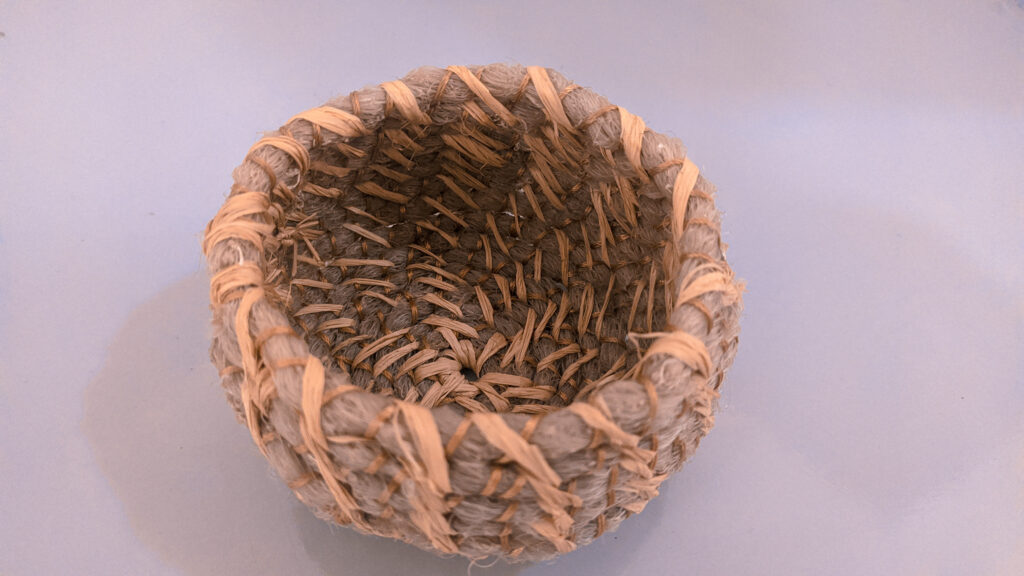
Basket made from old fish net during a SOFER Initiative Craft Workshop
When we patronize products made from recycled materials, we are in a very big way supporting a green environment. For some products, it is even more economical to recycle— For example, recycling steel can save at least 75% of the energy it would take to create it from raw materials. We can support recycling starting from the clothes we wear. Old bed sheets and apparels we no longer need can be donated to charity or given to the naked bodied street children sprawling some street corners. There are scrap metal dealers everywhere as well. We can take our used aluminium cans and other used metal based products to them. This way, we reduce the risk of it finding its way into open canals and posing problems in future.
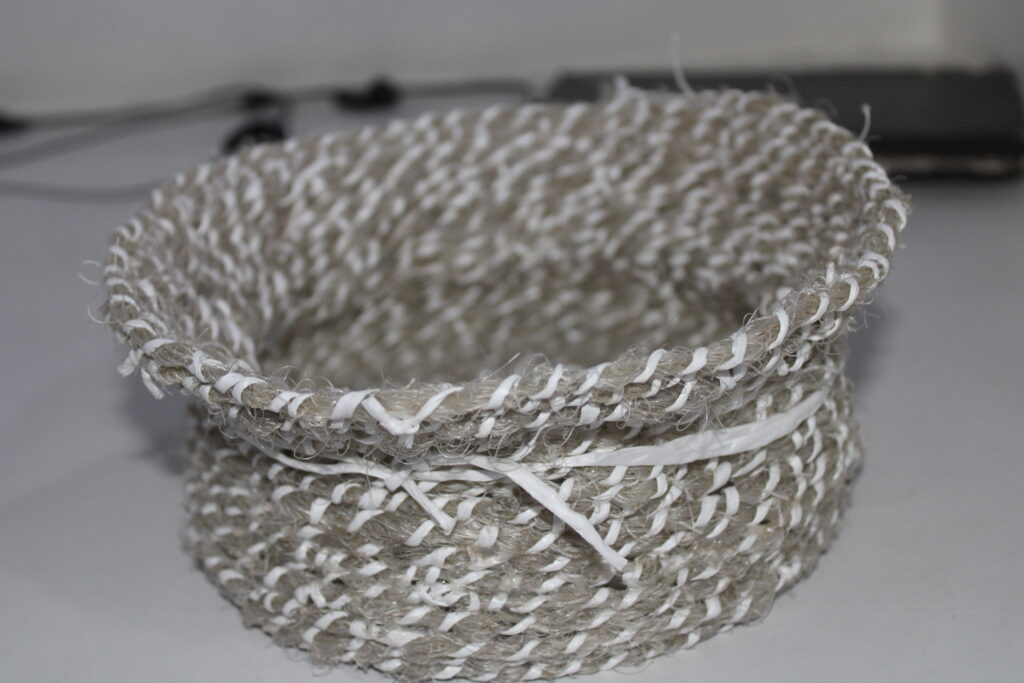
Hat made from Fish Net by SOFER Initiative Craft Team We can make conscious efforts to avoid products made from plastics; replace our plastic kitchen wares or boxes with stainless steel that can last over ten years than a plastic would. If you live in a community where there is no curbside collection of plastic bags for recycling, you could get creative and remake them into other items, such as rope strands for drying of clothes, plastic bag bracelets, plastic flowers and even plastic beads. Companies and individuals can also help by reducing their usage of unnecessary plastic bags because they contain harmful chemicals and can also end up in the oceans
Batteries are filled with toxic materials which could cause great harm to our environment. We can curb this by going green and buying rechargeable batteries instead. In some countries, there are some companies that collect used batteries for safe recycling. Even electronics these days can be recycled. We could make our old gadgets available to companies who need them rather than throwing them in the nearest thrash bin.
The government can also help by implementing recycling for organic wastes, especially in populated areas, set up websites according to cities that handles the issue of waste collection and recycling. They could also make a policy which mandates manufacturers to indicate through an icon how any disposable item can be disposed or taken for recycling. Recycle trash bins could be placed strategically in public places such as churches, schools, parks, etc. They could also make sure manufacturers use recyclable materials for packaging of disposable items.
Furthermore, they could make environmental education a mandatory subject for students across board, as well as encourage companies to carry out sensitization on waste management for their staff from time to time. The war against bad waste management can be won but that will only be when we all become Recycle Heroes by reducing the waste we produce, creatively reusing the items we can, and making the rest available for recycling.
Hart
KeymasterWhen it comes to season preference in Nigeria, it’s always a case of different strokes, different folks. While some may favour the wet, rainy season, others prefer the dry season; one, for the ease of movement as well as the pleasure it affords us at the beach-side, secondly for the memorable punctuation of dusty, dry winds which comes with the stint of harmattan. It’s been a tough dry season so far. Ever since the rains left us late 2020, most people have been hoping for a heavy downpour that will herald the arrival of their darling wet season. The heat has been almost unbearable, especially for people who have to work under the scorching sun on a daily basis. Even those who love the dry season secretly pray for a droplet, at least for a change.
The good thing is that the rain season is fast approaching with all its wonders— the darkening of clouds, the cool, soothing breeze, the race for cover when it pours and the pitty-patter of raindrops on our roofs. It is always a beautiful time of the year. But as we pray for rain, we should also prepare for it, emotionally and by our actions. The rain will surely come as expected. We’ve already had a few days of light showers but, we should be aware that a full blown rain season is not void of its challenges.
Through the course of the dry season, we have carried out activities that are rather harmful to us and the environment. Sometimes we consume carbonated drinks and dump the empty plastic bottles where is most convenient for us. We carelessly dispose of plastic bags, old clothes and other items such as batteries, wet wipes, containers of used household items in overflowing trash cans and worst case scenario; we dump them at road sides. While it may have been convenient for us, it will pose a very serious problem in the long run as most of these items are non-biodegradable.
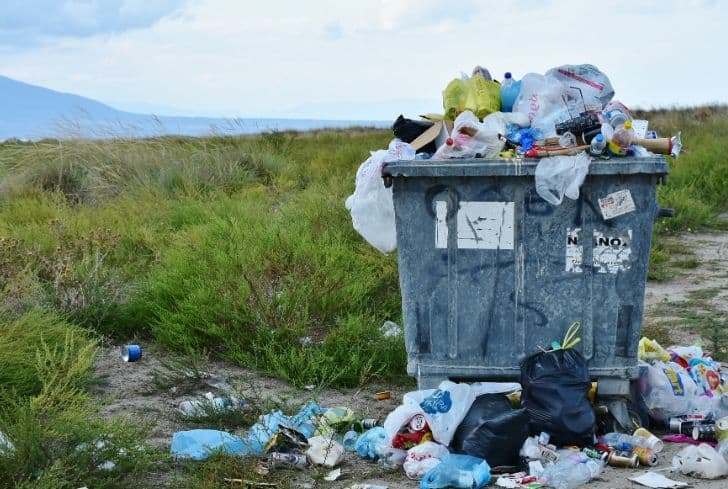
Credit: Conserve-energy-future.com Most urban areas in Africa operate the Open Sewer system and at the peak of the rainy season, heavy downpour is expected at least once a day. This means that most of the items that had not been properly disposed of will be washed into the open sewer, causing severe social and health complications.
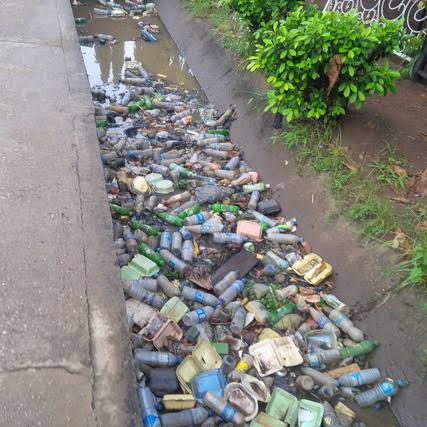
Used non-biodegradable products in an open sewer. Image Source: Twitter.com The plastic bottles, bags and other items will cause clogging in the sewer system, making it hard for the large body of water to pass through. This will by extension cause flooding which is quite harmful to humans and properties. Apart from this, it can also destroy roads. The excess moisture from flooding will reduce the strength of the materials used in making the roads, leading to swells and cracks. Houses close to drainage systems also stand the risk of being destroyed, creating not only economic but social problems. Clogging will also cause dirty body of water to settle in the open sewer, creating a breeding place for mosquitoes, exposing us to a greater chance of contracting malaria and yellow fever. For areas that practice open defecation, dirty rain water may contain faecal matter which throws us open to diseases such as cholera, typhoid, diarrhoea and other viral infections. For those who use rain water for domestic activities, just one of the old dry cell batteries carelessly disposed is capable of contaminating about 400 litres of water.
These open drainage systems open up into the ocean and what this mean is that marine life is not spared the mayhem. Every harmful item that was not properly disposed of will definitely find its way into the ocean, compounding an already existing problem. A plastic dropped in the sea could take hundreds of years before it disintegrates and scientists suggests that about 8 to 12 million tons of plastic are dumped into the ocean every year. Not only does this litter affect marine life, but it also washes onto beaches, gets caught in fishing nets, damages boat motors, is an eyesore and smells really bad. Plastic bags and wrap can asphyxiate marine animals and fishes. Sea birds can easily entangle themselves with plastic bags and strings. Animals also get sick and die from swallowing thrash such as cigarettes, silicon packets and metal scraps. Broken glasses can cut the flesh of birds and other animals. The statistics are not in our favour but against us. We have a whole lot of work to do in order to curb environmental pollution. If everyone can take responsibility by limiting their use of plastic based products, we will stand a chance of having a healthier environment and we will also be able to enjoy the soothing breeze and heavy downpour that comes with the rainy season without fear of destruction.
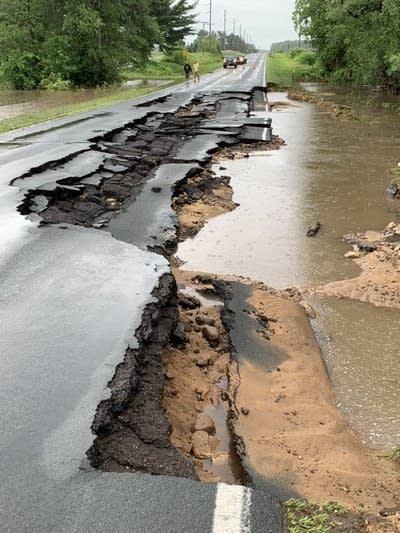
Road damage caused by flooding. Credit:Mrpnews.org We can also help by clearing out non-biodegradable wastes from the open drainage, give out used clothes to those who need them or properly dispose of it through incineration and also spread the word about the hazards that accompanies bad waste management. Let’s prepare ourselves so we can savour the rains in peace and also save the animals in our planet. Rain is a gift from nature, not a curse.
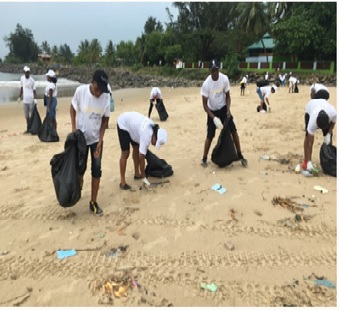
SOFER Initiative team carrying out a Beach Clean-up Exercise Hart
KeymasterThe Environment and Our Journey “SOFER”
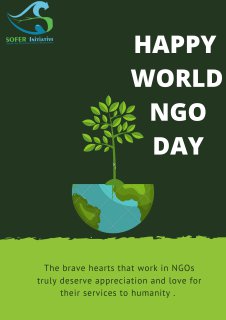
It’s a fast moving world. We make and break rules as we go. Things come in and out of fashion but one thing will never change; humanity. No matter whom we are or what we do, we will always need love, care, health, protection from abuse, neglect, exploitation etc. These never come in full supply and we never have our ideal world given the physical/economic wars, diseases, hunger and starvation that plagues us. It’s a sad human condition. We never pay attention to the things that matter and most times, it behoves certain individuals and groups to strategize and address some of these unmet socio-economic problems/needs they see around their immediate environment.
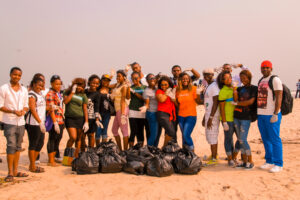
BEACH CLEAN UP EXERCISE All around the world, certain individuals have been on the front-line of making the world a better place through creating products and services to ease the burden of living. They have successfully created businesses, employed thousands of people, giving them financial independence. There are however others, who don’t run businesses or sell products, but carry out activities and needs the world government and private businesses for one reason or the other may not be able to meet. These are the Non-Governmental Organisations (NGO). Since 2014, the 27th of February of every year is usually set aside to celebrate the strides and efforts these groups contribute to humanity.
Right from the 18th Century, there have been several NGO’s the world over contributing their quota to maintaining a secure society and functional environment, encouraging healthy, active populations, reducing rates of diseases, strengthening the local populace and providing succour for economically and socially stressed communities. For the past ten years, we at SOFER INITIATIVE have been on the leading edge of environmental reforms, educating and creating awareness through working with youths and other bodies to provide practical opportunities for positive behavioural change. Today being The World NGO Day, we are joining the train and counting our gains.
The journey “SOFER” has been amazing as we have been able to actively engage various communities in Nigeria, sensitizing them through different programmes such Green Christmas project, Envirotainment, The Serene Uyo Campaign, Slam Dunk Your Trash, Beat Air Pollution, Boot camp Environmental Education (BEE), Beach Clean-up Exercise as well as our most recent, The Fishing Net Gains Project. Given the fact that fishery as a sector employs about 12 million Africans, we must do everything to ensure that the ocean and the lives in it are sustained and consequently, the source of livelihood it provides equally maintained or perhaps, improved. We have succeeded in raising awareness on the impact of Abandoned, Lost or otherwise Discarded Fishing Gears, (ALDFGs) and also proffered practical solutions and training for fishers on acceptable international best practices.
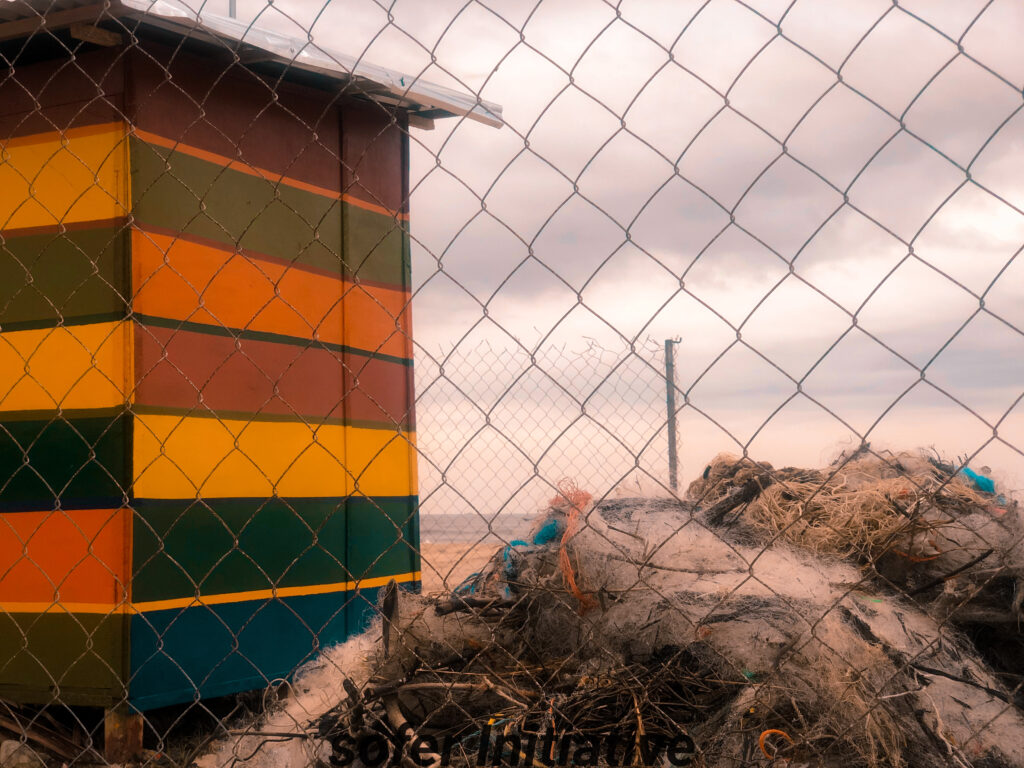
FISHING NET GAINS PROJECT This was made possible by our sponsors; The Ghost Gear Initiative (GGGI), Ocean Conservancy (OC), The Department of Fisheries and Oceans (DFO), Canada as well as the countless volunteers who brought their skills to bear in this cause. This is only the beginning and we will not stop. The world is ours and if we don’t take care of it, it’s our loss. It’s a duty we owe to ourselves and generations to come. As we mark the World NGO Day today, we say thank you to our sponsors, volunteers and other stakeholders who have made it possible for us to make tremendous impact over the last decade. Let’s make a toast to better things to come and renew our pledges to Stand Out For Environmental Restoration!
Hart
KeymasterHart
Keymaster10/07/2020 at 1:34 pm in reply to: SOFER Initiative receives the Ghost Gear Fund from Fisheries and Oceans Canada #18589Hart
KeymasterWe emerged as one of the beneficiaries of The Sustainable Fisheries Solutions & Retrieval Support Contribution Program Funding (SFSRSCP) through the Fishing Net Gains West Africa project (FNG-WA). A project designed to identify and tackle the issues of ghost gear and other related threats to marine life.
The Government of Canada is working hard to protect oceans and the marine life. Their target is to protect 25% of the oceans by 2025, and 30% by 2030. They are also working to increase marine protections from coast to coast as well as getting rid of harmful wastes. To combat these threats, the Fisheries and Ocean Canada, which is the federal lead for safeguarding waters and managing Canada’s fisheries, funded projects in Canada as well as internationally, through The Sustainable Fisheries Solutions and Retrieval Support Contribution Program (SFSRSCP) emerged.
The aim of SFSRSCP or Ghost Gear Fund is to achieve a healthy, sustainable and economic productivity of fish stocks and ecosystems by promoting awareness and involvement in relevant domestic and international commitments in support of conservation, protection and restoration of fish stocks and ecosystems.
The Ghost Gear Fund will support projects over two years (2020-2022) , and all projects fall under at least one of the four themes, or pillars of activity which include:
- Ghost Gear Retrieval
- Responsible Disposal
- Acquisition and Piloting of available technology and
- International Leadership
SOFER Initiative successfully emerged as one of the beneficiaries of this grant through the Fishing Net Gains West Africa project (FNG-WA). A project designed to identify and tackle the issues of ghost gear and other related threats to marine life.
The FNG-WA project is designed to cover two major cities in Nigeria. (Lagos and Bayelsa) with various activities ranging from
- The recovery of lost fishing gears
- Training of divers and volunteers
- Stakeholders workshops
- Craft Workshop
- HubNet Construction and
- The Fishing Net Gains West Africa (FNG-WA) Conference
The FNG-WA project would run for 2 years and will end in March, 2022.
We are grateful to the Government of Canada and the Department of Fisheries and Oceans (DFO) for this award and we look forward to playing our own part towards contributing to the target goal of protecting 25% of the oceans by 2025.
Join us in this exciting journey as we continue to raise awareness to the public on the impacts of Abandoned, Lost or otherwise Discarded Fishing Gears (ALDFGs).
Hart
Keymaster[cmsmasters_row][cmsmasters_column data_width="1/1"][cmsmasters_text]
On World Oceans Day 2020, Joanna Toole Foundation was officially launched. A foundation established in memory of Joanna Toole, who was a passionate advocate for the protection of all animals. Her achievements during her short career greatly reduced animal suffering and death around the world, and her legacy is being kept alive through the works of the foundation.
One of these works include the Joanna Toole Annual Ghost Gear Solutions Award, an award given to the most deserving projects aiming to tackle abandoned, lost and discarded fishing gears, also known as ghost gears.
We emerged the second winners and received a grant funding for our Fishing Net Gains Nigeria project which is aimed at engaging local fishing communities on the best practices for reducing ghost gear through prevention, mitigation and cure of ALDFGs. We are extremely grateful for this opportunity presented by the Joanna Toole Foundation and are hopeful that our ongoing project would help keep Jo’s legacy alive.
[cmsmasters_embed shortcode_id="4sq7x1h9kg" link="https://youtu.be/3ajwswApu0s" height="400" wrap="true" animation_delay="0"]
Entries for the Joanna Toole Global Ghost Gear Solutions Grant Award is ongoing : an award set up in partnership with Ocean Conservancy and World Animal Protection.
We encourage everyone that has a project to protect animal welfare to apply for support via Joanna Toole Foundation as we continue to carry on the legacy Jo was keen on building.
For more information regarding this , you can visit their website on joannatoolefoundation.org or follow them on twitter @JoannaTooleFdn.
[/cmsmasters_text][/cmsmasters_column][/cmsmasters_row]
Hart
Keymaster“Biodiversity” is United Nations Environment Programme’s(UNEP) theme for World Environment Day 2020. In line with this, our organization would focus on “Marine Biodiversity” as we are currently executing a project known as Fishing Net Gains Nigeria (F-NGN) which deals with issues of Abandoned, Lost, or Discarded Fishing Gears (ALDFGs) at sea.
The marine environment supplies many ecosystems that support biodiversity in coastal and open ocean habitats. Marine ecosystems provide many resources that are beneficial to the society and a significant proportion of the world’s population depends largely on the oceans and coasts for survival and well-being.
We understand the threat that the marine environment faces, some of which are as follows; overfishing, climate change, ghost fishing and other impacts of anthropogenic activities which all affect biodiversity. That being said, we at SOFER Initiative are more concerned with keeping a healthy marine ecosystem which is why the F-NGN project, designed in collaboration with the goals of Global Ghost Gear Initiative (GGGI) was created.
As World Environment Day approaches we would continue to enlighten you as well as share our works in the marine environment. We will also like to know what you would do in your own little way to save the marine environment.
Remember every little thing you do makes a difference!
17/03/2020 at 10:51 pm in reply to: SOFER Initiative – Second Recipient of the first Joanna Toole Ghost Gear Solutions Grant Award #18254Hart
KeymasterStand Out For Environment Restoration (SOFER) Initiative, a non-governmental organisation with the aim of raising environmental awareness by working with young people, providing practical ways to change behaviors for the better, based in Nigeria, after an impressive round of submissions were awarded the winners of the award alongside the UK’s International Pole and Line Foundation (IPNLF) and received a grant to contribute to their ghost gear project – ‘Fishing Net Gains Nigeria’ . The project which works to engage local fishing communities on best practices for reducing ghost gear through prevention, mitigation and cure will directly involve fishers in Nigeria, Cameroon and Ghana.
This award is in honour of Global Ghost Gear Initiative (GGGI) co-founder, United Nations worker, and former World Animal Protection campaigner, Joanna (Jo) Toole, 36, whose life was tragically taken in the Ethiopian airlines crash in March 2019. A woman that dedicated her professional life to ensuring our oceans were better and a safer place for marine wildlife.
Entries for the awards were reviewed by Ghost Gear experts from World Animal Protection and GGGI. The Joanna Toole Annual Ghost Gear Solutions Award is made possible by support from Joanna Toole Foundation, World Animal Protection, Ocean Conservancy, Ocean Foundation, SeaWeb and Jo’s friends, family members and colleagues.
SOFER Initiative is proud to be associated with Joanna Toole Foundation and appreciates the opportunity to continue preserving her legacies through this award.
Hart
KeymasterFishing Net Gains Nigeria (F-NGN). A name uniquely coined to portray our nation’s economy. How does fishing net gain Nigeria?
When you cast your net, you do that with anticipation – to get a catch that will ‘gain’ you. In the process of gaining, what does the environment get? Your GARBAGE – lost, abandoned fishing gears, plastics etc.
When I first came on board, my anticipation was basically to gain experience on stuffs like this (community service/engagement). What I’ve been engaged in so far, although just a tip of the iceberg, is mind-blowing!
I’ve gone on several trips with my team to get information on artisanal fishers, their activities and its impact on the environment. What baffles me mostly is that, these artisanal fishers do not know the level of their actions on the environment. We’ve been to fishing communities at the shoreline of Ibeno, Ibaka and Ikot Abasi. All three (3) communities are unarguably faced with a common problem – GHOST GEARS. Some (fishermen) with basic knowledge of environmental sanitation burn theirs, others couldn’t care less.
F-NGN has exposed me to the loud, yet silent problem we face, yes we, not just the marine life. Indiscriminate dumping of non-biodegradable waste into water bodies have a way of getting back at us directly or indirectly. You can’t dodge it.
The fact that the bulk of primary data needed for this project is unavailable, is very challenging. Going-out to gather this is very tasking physically, psychologically, even emotionally It breaks my heart to hear a fisherman say he’s dumping his non-usable fishing net into the ocean has no effect on marine life. From this, it’s obvious we have a great task to do. First and foremost, that is an attitude problem and ACT-E comes in.
Our mandate – Attitudinal Change Towards the Environment needs to be spread like a gospel. It all begins with the mind.
In the future:
- We hope to educate the artisanal fishermen on the need to fish sustainably.
- Educate them on proper fishing methods / techniques, waste disposal and recycling.
Our waters have life, if you choke it, it will die; and if it dies it becomes useless; and if it becomes useless, your net doesn’t gain you…
We sure want our nets to gain us!
Hart
Keymaster[cmsmasters_row data_width="boxed" data_padding_left="3" data_padding_right="3" data_top_style="default" data_bot_style="default" data_color="default" data_bg_position="top center" data_bg_repeat="no-repeat" data_bg_attachment="scroll" data_bg_size="cover" data_bg_parallax_ratio="0.5" data_padding_top="0" data_padding_bottom="50" data_padding_top_large="0" data_padding_bottom_large="0" data_padding_top_laptop="0" data_padding_bottom_laptop="0" data_padding_top_tablet="0" data_padding_bottom_tablet="0" data_padding_top_mobile_h="0" data_padding_bottom_mobile_h="0" data_padding_top_mobile_v="0" data_padding_bottom_mobile_v="0" data_shortcode_id="htr1d2xvab"][cmsmasters_column data_width="1/1" data_bg_position="top center" data_bg_repeat="no-repeat" data_bg_attachment="scroll" data_bg_size="cover" data_border_style="default" data_animation_delay="0" data_shortcode_id="97ewlh8ebv"][cmsmasters_text shortcode_id="xmbuz9q88j" animation_delay="0"]
Fishing Net Gains (FNG) is a 3-year project fundament designed in line with the Global Ghost Gear Initiative (GGGI) & Department of Fisheries Canada (DFO) goals of identifying and tackling the issues of ghost gear and other related threats to marine life in Nigeria and the West Coast of Africa by creating economic frontiers for coastal communities and harnessing collaboration with government and stakeholders on policy development and standard practice.
This project aims to;
- Raise awareness in the public on the impacts of Abandoned, Lost, or otherwise Discarded Fishing Gears (ALDFGs).
- Generate relevant primary data on ALDFGs in the West African coast.
- Formulate standard and recommended practices that will provide guide for ALDFG policies.
- Improve the livelihood of host communities through craft innovations using recovered ghost gears.
- Proffering solutions to tackling the problems of ALDFG.
- Create awareness on the issues of other marine debris especially ocean plastics.
- Develop and recommend standard practices for establishing the Fishing HubNets (F-HubNets)
- Promote community integration and participation in the FNG project through the F-HubNet program.
- Help fishers avoid hazardous zones during fishing activities by broadening their understanding of gear conflicts.
- Keep track of emerging new data on
- Educate fishers on needs for data management.
- Help avoid oil and gas pipeline related gear incidents.
- Proffer sustainable recycling solutions through creative craft contest and replicating solutions.
FNG is designed to function on the tripod consciousness of ‘Prevention, Mitigation, and Cure’. The following designed projects are tailored towards achieving the aforementioned objectives cutting across these functions.
Research and Development; to generate valid primary data on ALDFG, FNG project will cover the following activities;
- interaction and engaging four fishing entities (Fishers, Governments, Fisheries, Local Communities) in Nigeria, 1 each in Ghana and Cameron for the purpose of collecting data.
- Data collection will be via interviews, questionnaires, and existing history of ghost gears in communities.
- Data management will involve GGGI data base on ghost gear, GGGI gear reporter app.
- Relevant data from fishing gear manufacturers and distributors.
- FNG Seminar will engage stakeholders (Government Ministries, Departments, and Agencies, Corporate Fishing Companies, Ghost Gear Manufacturers, Divers, GGGI, DFO, etc.) identified in ALDFG marine debris chain in formulating best practices and policies that cut across ‘prevention, mitigation, and cure’ of ALDFG, resulting in improved health of marine ecosystems, protection of marine animals, and the safety of human health and livelihoods.
- FNG Workshop will bring together fishers, divers, fishing companies, community leaders and youths, sea food traders and consumers to discuss issues surrounding fishing gears and the economic benefits to the community. Deliberate on gear loss due oil and gas pipeline network in the ocean and vessel related conflicts.
- Craft Workshop: a program designed for women in the local communities with the set objectives to empower and create alternative sources of income as support for their fishermen-husbands while being productive.
- Diving Programs for Data/Recovery: FNG diving programs will help generate and improve primary data analysis on ALDFG in Nigeria and the West African coast. It will give informed directions on ghost gear recovery and prevent future entrapment of marine animals. The programs will cover 1) developing partnership with Scuba Lagos, Nigeria and PADI to recruit trained divers into the Divers Volunteer Corp Program; 2) Sponsor a volunteer to acquire diving license for coaching purposes; 3) Recruit local commercial divers into the Divers Volunteer Corp Program; and 4) Sponsor a Dive For Data (DFD) recovery program in partnership with PADI.
- Community Based Volunteered Corp: there will be community workshops and training on ALDFG for community volunteers. This is to ensure FNG project sustainability by establishing a community group that will continue with the culture after the project ends.
- The F-HubNet: this will include construction of the HubNet as a core aspect of FNG within the fishing communities. It will serve as the collection point for recovered gears, data collection centre, reporting centre and complaint centre. Subsequently, there will be quarterly data information upload on the GGGI Data Portal.
[/cmsmasters_text][/cmsmasters_column][/cmsmasters_row]
Hart
Keymaster[cmsmasters_row data_shortcode_id="5b08nereka" data_padding_bottom_mobile_v="0" data_padding_top_mobile_v="0" data_padding_bottom_mobile_h="0" data_padding_top_mobile_h="0" data_padding_bottom_tablet="0" data_padding_top_tablet="0" data_padding_bottom_laptop="0" data_padding_top_laptop="0" data_padding_bottom="50" data_padding_top="0" data_bg_parallax_ratio="0.5" data_bg_size="cover" data_bg_attachment="scroll" data_bg_repeat="no-repeat" data_bg_position="top center" data_color="default" data_bot_style="default" data_top_style="default" data_padding_right="3" data_padding_left="3" data_width="boxed"][cmsmasters_column data_width="1/1" data_shortcode_id="nkil0pjwfe" data_animation_delay="0" data_border_style="default" data_bg_size="cover" data_bg_attachment="scroll" data_bg_repeat="no-repeat" data_bg_position="top center"][cmsmasters_text shortcode_id="s79nc7c9bq" animation_delay="0"]
Fishing Net-Gains (FNG) is a project designed to identify and tackle the issues of ghost gear and other related threats to marine life in Nigeria and the West Coast of Africa by creating economic frontiers for coastal communities and harnessing collaboration with government and stakeholders on policy development and standard practice.
FNG pilot is designed to cover coastal communities: Mkpanak/Uta-Ewa in Akwa Ibom State, Nigeria, Ilaje in Lagos State, Akassa in Bayelsa in Nigeria within a year (2019 – 2022) albeit with certain data research activities extending to other parts of West Africa.
GOALS OF THE PROJECT
We hope to achieve the following goals on the completion of this project:
- Strengthening environmental values among the residents of Ibeno, Uta-Ewa, Ilaje, & Akassa communities.
- Reduction of mortality rate in the communities’ marine life as it relates to ALDFGs.
- Widening the community’s involvement in the United Nations Environment/GGGI programs/DFO/activities.
- Reduce the economic challenges of women and youths in the community and raise living standards through ghost gear inspired craft innovations.
- Extend the economic frontier of these communities through partnerships with recycling firms.
OBJECTIVES OF THE PROJECT
- Raise awareness in the public on the impacts of Abandoned, Lost, or otherwise Discarded Fishing Gears (ALDFGs).
- Generate relevant primary data on ALDFGs in the West African coast.
- Formulate standard and recommended practices that will provide guide for ALDFG policies.
- Improve the livelihood of host communities through craft innovations using recovered ghost gears.
- Create awareness on the issues of other marine debris especially ocean plastics.
- Develop and recommend standard practices for establishing the Fishing HubNets (F-HubNets)
- Promote community integration and participation in the FNG project through the F-HubNet program.
- Help Fishers avoid hazardous zones during fishing activities by broadening their understanding of gear conflicts.
- Keep track of emerging new data on ALDFG.
- Educate Fishers on needs for data management.
- Help avoid oil and gas pipeline related gear incidents.
- Proffer sustainable recycling solutions through creative craft contest and replicating solutions.
[/cmsmasters_text][/cmsmasters_column][/cmsmasters_row]
-
AuthorPosts
